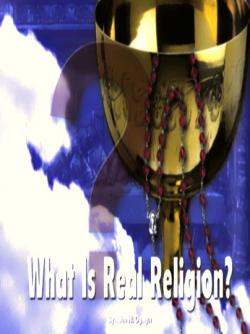Kwanzaa, Christmas and God's Word
A December "harvest festival"—Kwanzaa—is gaining popularity in the United States, though some criticize its historicity and substance. But how many realize that God Himself proclaimed a "harvest festival" and that the most widely observed December festival—Christmas—is no more biblical than Kwanzaa?
During December, billions around the world will turn their attention to annual festivals of their faiths. Jews will observe Hanukkah and Muslims will mark the end of Ramadan, while billions of professing Christians will keep Christmas. Alongside these festivals, a growing number of African-Americans celebrate, from December 26 to January 1, a festival they call Kwanzaa, derived from African harvest celebrations.
Last year, President Bill Clinton issued a formal White House proclamation describing Kwanzaa as a tool to help African-Americans preserve "what we value of our past." The President praised Kwanzaa for its "focus on the values that have sustained African-Americans through the centuries."
Yet Kwanzaa did not exist before 1966, when it was invented by African-American activist Dr. Maulana Karenga. Commentators seized on the President's statements, mocking him for supporting this recently manufactured holiday; columnist Ann Coulter wrote that "it is as if David Duke invented a holiday called 'Anglica' and the President of the United States issued a proclamation honoring the synthetic holiday" ("Kwanzaa: Holiday from the FBI," Town Hall, January 1, 2001).
Coulter and others mock Kwanzaa's "synthetic" origins. Yet many do not realize that Christmas is just as synthetic as is Kwanzaa. Religious scholars acknowledge that Jesus Christ was not born on December 25. Neither Christ nor the Apostles celebrated His birth and, for generations afterward, His birthday was neither known to nor celebrated by professing Christians. "The [Church] Fathers of the 2nd and 3rd centuries, such as Clement of Alexandria, Origen, and Epiphanus, contended that Christmas was a copy of a pagan celebration"("Christianity," Encyclopaedia Britannica, Vol. III, p. 499).
Only in the 4th century ad did professing Christians throughout the Roman Empire set aside December 25—a day holy to worshipers of Mithras and Sol Invictus—to celebrate Christ's birth. An almanac from Rome notes a December 25, 336ad observance of Christmas, though other cities resisted this innovation for decades more. Correspondence by Cyril of Jerusalem (ca. 348–386ad) shows that as late as 385ad, the Church in Jerusalem was not keeping this Christmas celebration. Kwanzaa-keepers today are doing just what Christmas-keepers did long ago—using, for spiritual purposes of their own devising, a time of celebration already honored by civil society.
Most who celebrate Kwanzaa do not realize that God Himself gave mankind a "harvest festival" to observe. Millions of Jews, along with the thousands of genuine Christians following the example of Jesus Christ and His disciples, celebrate the seven-day Feast of Tabernacles, which occurs in the autumn of each year.
Unlike Christmas or Kwanzaa, the date of the Feast of Tabernacles comes from Scripture (Leviticus 23:34). The Feast of Tabernacles, also called the "Feast of Ingathering" is, like Kwanzaa, a "harvest festival" (Exodus 23:16; 34:22)—but it carries a deeper and God-given meaning. God uses the Feast of Tabernacles to teach Christians about the future Kingdom of God on earth, during which Jesus Christ, born to be a king (Luke 1:32–33), will rule all nations (Revelation 11:15). Under Christ's coming millennial rule, all of mankind will keep the Feast of Tabernacles (Zechariah 14:16–17).
During the Feast of Tabernacles, God's people reside in temporary dwellings as a reminder that we are all strangers and pilgrims on this earth (Hebrews 11:13). They rejoice that under Christ's soon-coming rule, the world will be at peace and His "harvest" will encompass all nations, not just the "firstfruits" He is calling today.
Billions keeping Kwanzaa and Christmas are missing out on the inspiring truth that God has given us through His Word. His annual Holy Days reveal His plan for humanity with a depth not known to those who instead keep their own man-made holidays.






